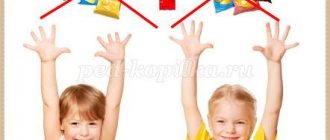Presentation “Profession - primary school teacher” presentation for a lesson on the topic
Slide 1
Profession Primary school teacher Kozlitskaya I.V., primary school teacher, Municipal Educational Institution Secondary School No. 10, Kamensky village, Krasnoarmeysky district, Saratov region 2010
Slide 2
Teaching is an art, work no less creative than the work of a writer and composer, but more difficult and responsible. The teacher addresses the human soul not through music, like a composer, or with the help of paints, like an artist, but directly. He educates with his personality, his knowledge and love, his attitude towards the world. D.S. Likhachev
Slide 3
I am a teacher. A teacher is not even a profession. It's a way of life. This is an awareness of enormous responsibility to the state, society, and above all to the student. Every day the eyes of my students look at me. The future of Russia sits at the desks in my classes. And I also have to live in this future. And not only the life of the country, but mine too, depends on what these children become.
Slide 4
. I am the first teacher I am not just a teacher. I am the first teacher. I am the first teacher who enters the life of a child and his family. Parents trust me with the most precious thing they have - their children. There is probably not a single parent in the world who would not care about how his child will study at school, what kind of relationship he will have with the teacher, with his peers, and how joyful and useful learning will be for him. And it depends on me, the first teacher, how the child’s school life will turn out. It depends on me how parents will relate to school, whether they will become faithful associates and like-minded people. For many years I will be invisibly present in the family of every student. And perhaps I will become a good family friend for life. How can I not spill or lose the trust that my students and their parents so generously give me?
Slide 5
Why did I choose primary school? Any building must have a foundation that cannot be replaced by a beautiful façade, a fashionable interior, or a new roof. Without a foundation, the building will collapse. It is precisely this foundation in the life of every person that is primary school, or rather, the knowledge, abilities, skills and qualities acquired in primary school. Therefore, a person who chooses the profession of a primary school teacher must be accurately aware of the burden of responsibility he is going to shoulder. No wonder people say: “In middle and high school, look for an advanced school for your child, and in elementary school, look for a good teacher.”
Slide 6
Seven conditions for a successful primary school teacher What should a primary school teacher be like? I would like to offer to your attention MY MAGICAL FLOWER, with the help of which I have been trying for many years to create the miracle of turning a little person into a STUDENT with a capital letter. My flower is called “SEVEN U” Moderation Success Ability to surprise Persuasiveness Respect Balance Smiling
Slide 7
Moderation MODERATION is a combination of calm exactingness with a good, friendly attitude towards children. According to the observations of psychologists, children for some reason love demanding teachers more. The child should know that if the teacher gives a task, he will definitely check it. On the other hand, clear disciplinary frameworks in the classroom create a sense of security when communicating between teacher and student. When a child sees boundaries in behavior (what is allowed and what is not), fear does not arise and aggression does not arise. Classes with a high level of aggression among children towards each other are classes with weak discipline.
Slide 8
Success SUCCESS is a story about how children don’t like pies with anything. This means that the image of a primary school teacher should serve as the personification of an active, successful life position. For example: “Our Maria Ivanovna is the best, we want to be proud of her. She will succeed, she can do anything, she will always help with everything.”
Slide 9
The ability to surprise An elementary school teacher must be able to surprise. A child in elementary school is a climber standing at the foot of a high peak, which he will have to climb for 11 long years. A child comes to 1st grade with his eyes wide open in surprise. Everything surprises him! And the teacher must not only not extinguish this light in the student’s gaze, but also try to rekindle it as brightly as possible. Psychologists believe that the extent to which a primary school teacher manages to maintain motivation for learning for 4 years, the stronger this motivation will be in the future. It’s not for nothing that the main goal of elementary school is to LEARN TO LEARN!
Slide 10
Persuasiveness A primary school teacher must be able to speak to children in their language. Swiss psychologist Jean Piaget said that “a child is not a small adult.” Children have their own world, their own language, their own concepts and definitions. Of course, there is no need to fall into the “bird language”, but a primary school teacher is simply obliged to find such words and formulations to be understandable and convincing for the child!
Slide 11
Respect It is clear that respect for the personality of each little person is the basis for successful communication in the classroom and, accordingly, the entire learning process in elementary school. I think that a teacher must respect the self-esteem of each student under all circumstances. Only deep respect and trust, sincere love for children, and careful consideration of their feelings can create an atmosphere of mutual understanding. We need to teach children to defend their beliefs based on a clear idea of good and evil.
Slide 12
Balance The teacher's nervousness in the lesson is always transmitted to the children, which provokes fear: fear of answering incorrectly in class (of course, I will say incorrectly, and Maria Ivanovna will start swearing). In this case, even knowing the correct answer, the child will sit without raising his hand. On the other hand, a lesson in elementary school should not be dry. A primary school teacher is not a machine for dispensing scientific information. The lesson should be interesting, and sometimes even fun. And in classes with a nervous environment and an unbalanced teacher, children are afraid to react with laughter even to the teacher’s joke.
Slide 13
Smiling Even S. Exupery said that “a smile is a teacher’s working tool,” and in elementary school, with the help of a smile, a teacher can achieve anything. The only condition is that the smile must be sincere, because the most important thing is to love this little man who is just beginning his journey into adulthood.
Slide 14
So, if you have patience, hard work, love for children, an open heart and a pure soul, noble thoughts, creative abilities, as well as the desire to make our society better - We have a lesson to check everything with fate and the hot breath of the century. You and I must raise a person for the native country of the Young One. Let us carry with us through all the years these eternal words: “I devote my life to childhood forever, I give my heart to children!” From the anthem of pedagogical college No. 14 (Authors: L. Khokhlova, V. Litvinov, PC No. 14)
Slide 15
Useful links https://festival.1september.ru/articles/519665/ - German Yulia Leonidovna, primary school teacher https://ped-portal.ru/blog/lenusik/%d0%be%d0%b1%d0%be -%d0%bc%d0%bd%d0%b5/%d0%bc%d0%be%d1%8f-%d0%bf%d1%80%d0%be%d1%84%d0%b5%d1% 81%d1%81%d0%b8%d1%8f/ https://profedu.ru/college/who/detail.php?ID=1718
Presentation of the work experience of a primary school teacher
Olga Kuklina
Presentation of the work experience of a primary school teacher
Explanatory note
for a presentation on the work experience of a primary school teacher , 2nd grade class teacher at MBOU "Krasnogorsk Secondary School"
Kuklina Olga Vasilievna.
Teaching experience – 33 years .
Training and education in accordance with the new standards of the Federal State Educational Standard is activity-based in nature, that is, the child must be able to choose those types of activities that are adequate to his nature, satisfy his needs for self-development and self-realization
Education cannot be successful without a system of work . The creation of humanistic educational systems is the most effective and sure way in education.
The novelty of my work lies in the fact that I use innovative approaches, search and use of modern technologies:
- health-saving;
— gaming technologies;
— design and research;
— ICT technologies;
— project-based learning technologies.
This is done so that the child feels comfortable in the children's team, can freely communicate, play, show compassion and strive for mutual assistance and mutual support.
Taking into account the characteristics of the class , the age characteristics of the students and in accordance with the school model of educational work , I draw up a program of educational work for four years .
The goal of the program is to create an educational classroom that promotes the comprehensive development of the child’s personality.
Achieving this goal is possible by solving the following tasks:
— formation in the classroom of a spiritual , moral and emotionally favorable environment that contributes to the development and self-realization of each student;
— involvement of parents in the educational process, with the aim of revealing and developing in the child the best qualities necessary for self-determination and self-realization;
— formation of a class team , development of student self-government in the classroom ;
Educational work within the program includes:
project and research activities;
organization of excursions and integrated educational trips;
hiking;
holidays, quizzes, competitions;
circles and sections.
A special feature of the program is its focus on creating an emotionally attractive environment for children to stay in an educational institution, ensuring the comprehensive development of the child’s personality. This is possible only with properly organized joint activities of students, teachers and parents.
One of the conditions for working with parents is the teacher’s in the field of family pedagogy, understanding of its specifics and ways of interaction with school pedagogy. Another is the education of parents in the field of pedagogy. The teacher and parents need mutual enrichment of knowledge in understanding the child and his problems in order to correctly select methods and methods of education and upbringing in order to develop his personality.
When defining tasks, it is important for the teacher to understand that the focus of his attention, first of all, is the student, and interaction with his parents is aimed at helping in the development of the child’s personality.
When working with parents, the teacher is given the following tasks : educational; educational; organizational; informational; specific.
My interaction with parents includes three main areas:
• psychological and pedagogical education of parents
• involvement of parents in the educational process
• participation in the management of the educational process
Psychological and pedagogical education of parents is carried out in the form of:
• parent meetings, exchange of experiences ;
• individual and thematic conversations;
• parent meetings;
To involve parents in the educational process, I use the following forms of working with families :
• Days of creativity;
• Open lessons and extracurricular activities ;
• Assistance in organizing and conducting extracurricular activities .
Children are satisfied with the results of extracurricular activities ; there is a positive attitude of students and their parents towards educational work . The social activity of schoolchildren has increased. Children began to show abilities for original thinking and a desire for creativity.
Description and characteristics of the profession of primary school teacher
The profession of a primary school teacher requires a specialist to combine many qualities, both personal and professional. The importance of the teacher’s task is difficult to overestimate - he lays the foundation for all a person’s future knowledge, shapes his worldview, and begins the child’s social adaptation. The first teacher solves an incomprehensible number of problems and daily answers a lot of questions that constantly arise in the heads of children. And every decision or answer must be competent and strategically correct, because the knowledge acquired in elementary school is used by a person throughout his entire adult life.
The uniqueness of the profession of a primary school teacher lies in the combination of several social statuses at once. If you ask children to write an essay on the topic of the profession of a primary school teacher, they will call her not only a teacher, but also an organizer, a parent, a friend, a good assistant, a psychologist, and even a fair judge in numerous children’s conflicts.
Moreover, the teacher takes an active part in the formation of the team, which currently exists only on paper. Formal activities as part of a standard teaching load are not about the profession of a primary school teacher. The social work of the teacher determines how strongly the children will unite, whether they will be friends and build harmonious relationships with each other throughout all the years of their education.
Important personal qualities of a representative of this profession include:
- love for children and desire to take care of them;
- sensitivity and attention to children's needs;
- the ability to correctly assess and reveal children's potential;
- the ability to resolve controversial situations, reconcile children in conflicts;
- showing perseverance in your work;
- team management based on democratic values;
- positive attitude towards the profession;
- tolerance and active life position.
Basic requirements for the profession of a primary school teacher:
- implement formal educational programs for primary school students;
- implement a personality-oriented approach in interaction with students, analyze their individual qualities, analyze their level of training.
- design the development of personal qualities of schoolchildren;
- assist specialists in the field of correctional work with children with developmental disabilities or delays.
- plan lessons, extracurricular activities, study and analyze didactic materials, educational programs;
- carry out explanatory work with parents on issues of home education and family education of the child.
History of the profession of primary school teacher
Often the presentation of the profession of a primary school teacher in educational institutions includes the thesis that a teacher is the oldest profession. It is obvious that the teaching profession is one of the oldest in civilization, but whether it is the oldest is unknown today. Training and education became independent functions even before the emergence of scientific knowledge, and the first schools opened in the territory of the Ancient East, where education was carried out only by men from the priestly caste. The first official mention was found in Egyptian sources dating back over 2500 BC.
Schools became widespread in Ancient Greece. Greek boys aged 7 to 14 years old studied grammar, singing, music, and oratory. The children in such a school were taught by a dadiskal (teacher), accompanied by a teacher (accompanying slave). The profession of primary school teacher came into slight decline during the conquests of Ancient Rome. The Roman system emphasized a broad liberal arts education to prepare political leaders. Boys who had already received primary education from about age 11 were accepted into schools. They had to receive primary education, for the most part, at home.
In the Middle Ages, monastery and church schools were widespread. There was no division into primary, middle and high school for students. The training was conducted by monks, and each student received an individual task.
The teaching profession became widespread in the era of capitalism, in the 18th and 19th centuries. Upbringing and primary education were common in noble and bourgeois families, and teachers were called tutors. Towards the end of the 18th century, a need arose for professional training of teachers, and state standards and training requirements were created everywhere. In Russia, the first educational institution preparing professional teachers appeared in 1779; at the beginning of the 19th century, their number began to grow rapidly. Primary school teachers were trained in teachers' seminaries for four years. By 1971, 171 teacher seminaries were operating. In addition to seminaries, specialists were trained in pedagogical classes, women's gymnasiums, women's diocesan schools, and the St. Petersburg Pedagogical Institute.
By the 1980s of the twentieth century, a network of pedagogical universities with a large number of specializations had been formed. Subject teachers and primary school teachers were trained separately.
A separate project has appeared for the profession of primary school teacher and other age levels. In the 1990s, the profession of a primary school teacher can be obtained, in addition to universities, in secondary specialized educational institutions.
Advantages of being a primary school teacher
The obvious advantages of the profession include:
- opportunity to realize creative potential;
- the work process does not turn into a routine, since you have to work with a large number of children who are different from each other and find an individual approach to each;
- the task for the working day is specific and understandable, every minute is filled with activity;
- extensive social package;
- long vacation;
- the opportunity to communicate with children - for many people entering the profession, this is the most significant plus.





